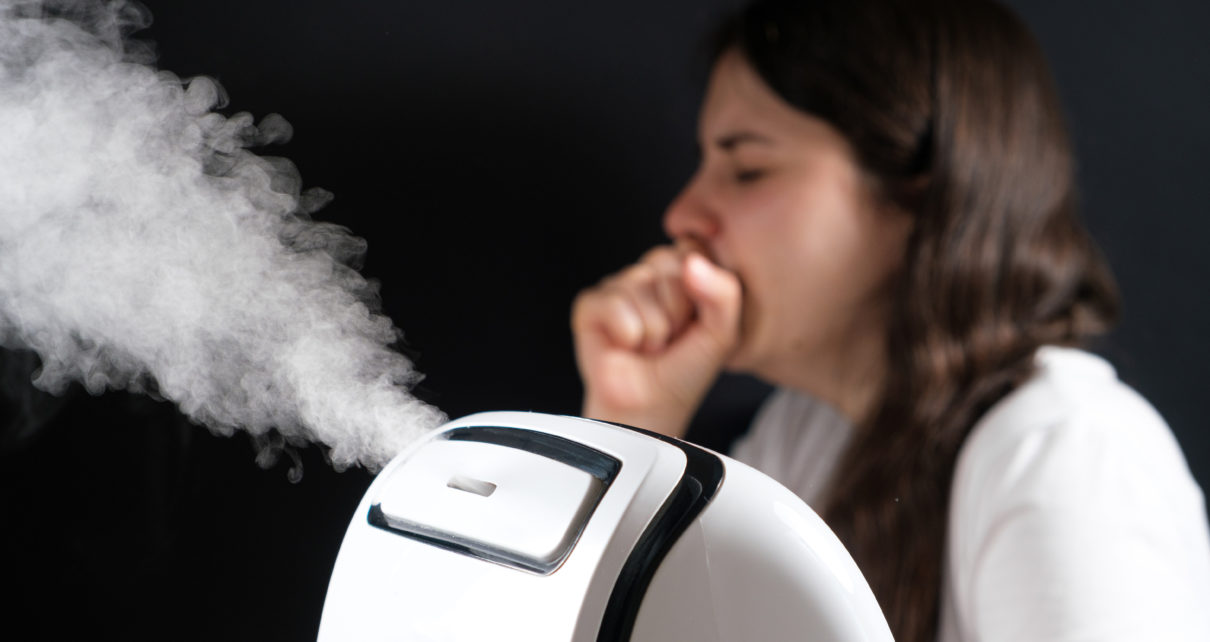
The coming of spring heralds the beginning of allergy sneezing. Many people can avoid these symptoms by limiting time outdoors but there are still factors indoors that can cause cough, dry skin, sore throat, and more. While looking out for your health, you’ve probably considered about the quality of the air in your home — but what about the humidity? Low humidity can contribute to some of the same persistant allergy symptoms. Maybe you’ve wondered does a humidifier help with a cough? We’ve done all the work to get answers.
What Does a Humidifier Do?
A humidifier is quite simply a device that increases humidity. The term humidity refers to the amount of water vapor in the air while relative humidity measures the current amount of water in the air in relation to the maximum amount of water vapor the air can hold . For example, the higher the temperature rises, the more water vapor the air can hold.
Indoor humidity levels tend to be lower than outdoor levels due to a lower relative humidity, especially during the winter. When cold air enters the house and your heating system warms it, the air expands. The actual humidity in the air remains the same but the relative humidity reduces significantly.
In homes where indoor humidity is too low, a humidifier can help balance things out. Whole home humidifiers can help keep the humidity throughout your at a consistent level. If that’s not practical or affordable for you, a portable humidifier might be the right choice.
Can a Humidifier Help with a Cough?
Not only can low indoor humidity lead to dry skin and chapped lips, but it worsen cough and cold symptoms. When the air is dry, your coughs may not be productive and you may experience nasal congestion or difficulty breathing overnight.
A humidifier can help moisturize the nasal passages as well as the throat and lungs to loosen mucus and soothe coughing. It may not, however, be as beneficial for people with asthma or allergies — if they’re properly maintained. A dirty humidifier can grow bacteria and fungus which can exacerbate respiratory problems and might even be dangerous.
Not only can a humidifier itself harbor bacteria, mold, dust mites, and other allergens, but its use could contribute to conditions that support their growth on other surfaces. Placing a humidifier on the floor, for example (especially carpet) could lead to condensation and dampness.
How to Keep a Humidifier Clean
Daily humidifier maintenance involves refilling the water tank, but it’s important to do a thorough cleaning about once a week. When you’re finished using the humidifier for the day or night, empty the tank, rinse it out, then let it dry completely before filling it again.
Once a week, use a vinegar solution to remove mineral buildup in the tank and flush with a 10% bleach solution to disinfect it. Be sure to rinse the tank well before refilling the tank. You should also check your filters and cartridges often and change them as recommended in the manufacturer’s instructions.
What Else Can You Do to Relieve Cough?
A lingering cough can be caused by any number of things. Conditions like bronchitis are characterized by chronic cough and it can also be caused by cold or flu. Asthma and allergies are also commonly linked to coughing.
If you suspect that allergies are causing you to cough, think about reducing your exposure to the things that trigger your allergies. You don’t necessarily need to replace your lawn with turf or your garden with plastic flowers, but there are a few precautions you should take.
On windy days, try to stay indoors as much as possible – especially when outdoor humidity levels are low. The best time to go outside may be after a rain because the rain helps clear pollen from the air. After you spend time outside, it’s best to change your clothes and take a shower to remove pollen and other allergens from your skin and hair.
If you’re allergic to grass or certain plants, you may want to avoid gardening or mowing the lawn. Should you find yourself needing to do these tasks, try wearing pants, a long-sleeved shirt, and gloves. You may even want to wear a face mask when doing work outside. Before doing outside chores you can always check your local TV or newspaper for information about current pollen levels in your area.
In cases where cough isn’t related to allergies, it could still be something in the air that’s causing the problem. The air in your home can carry dust, irritants like smoke, and pathogens that could make you sick. An air purifier can remove microscopic particles from the air to improve the air quality in your home and help you breathe easier. Using a high-efficiency filter in your whole-home heating and cooling system may also help.
Some people may also find relief with a dehumidifier. While dry air can lead to cough and sinus congestion, high humidity levels also have the potential to exacerbate respiratory problems. A dehumidifier helps mitigate high humidity levels and can help remove larger particles from the air as well. Many come equipped with filters which can help remove airborne allergens and irritants like pet hair, dander, and dust mites.
Bottom Line
We all suffer from coughs and colds from time to time, but certain indoor conditions can trigger symptoms more often or prevent them from going away. Low indoor humidity levels can exacerbate existing respiratory problems or create new ones. Fortunately, a humidifier can help.
Not only can a humidifier help increase indoor humidity levels, but the right model will monitor those levels and automatically adjust as needed. If you choose to use a humidifier to relieve cough, make sure to keep it clean and use as directed.
